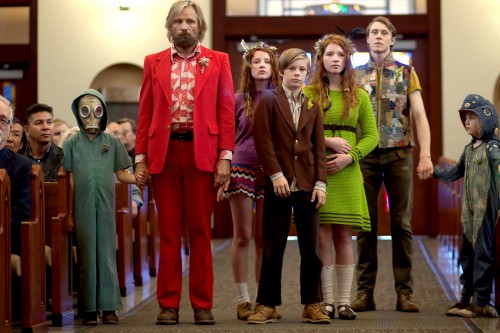
An outlandish but tender father, Ben—a one-of-a-kind role executed exquisitely by Viggo Mortensen—prominently discusses thematic issues on parenting, knowledge, loss and one’s own courageous behavior, with an approach by Matt Ross’ direction and script that not only enlightens within the circumstances, but radiates with the satisfaction of living. In “Captain Fantastic”, a loving couple ditched all regulatory norms to raise their six children deep, off the grid in the Pacific Northwest where the only telephone line is an afternoon drive in a shanty bus named Steve.
Strictly and rather aggressively, Mortensen’s ability to continuously push – and sometimes burden – his offspring’s to achieve ways of living that a capitalistic society does not hone to do (like surviving in the woods with nothing but a knife or being initiated into adulthood by leading a hunt and ending it by taking a large bite out of a deer’s still bloody organ). Although the perfect intended lifestyle is quickly interrupted by the mother’s sporadic mental bipolar disorder, ultimately leading to her drastic suicide and the journey to her funeral.
The first scene encapsulates the setting, immersing the audience into a strategic ritual hunt. The eldest son, Bodevan (a strong willed George MacKay), ranks into adulthood after successfully and maliciously killing a deer, or as in their minds – retrieving dinner. This marks just one of the six shining young actors that impress with bold knowledge and thoughtfulness. Each with a unique name – that is not to be modified with –is the youngest and rather curious Nai (Charlie Shotwell), the angered and rebellious middle son Rellian (Nicholas Hamilton), Zaja (Shree Crooks) and the adventurous and witted teenage daughters Kielyr (Samantha Isler) and Vespyr (Annalise Basso).
A call for change occurs when the mother Leslie (Trin Miller) takes her own life at a treatment rehabilitation center, after a grueling battle of mental bipolar that had her emotionally elate at her highest of times and rather catatonic at her lowest. “Your mother is dead,” direct and sternly Ben unfolds the news to his six children, “Nothing will change.” Unwillingly, at first, Ben is under a keen impression by his lucrative father-in-law Jack (Frank Langella) who orders for his arrest if he attends the funeral due to the intended lifestyle that Ben and Leslie created for their children which, unfortunately triggered the majority of Leslie’s responses. Still deep in the woods, Ben is forcefully training his coup vigorously by scaling slick rock walls minutes before a downpour to assigning weekly tests and readings to comprehend – and they in fact do – Lolita and Middlemarch and The Brothers Karamazov to name a few. Through mourning and their gruesomely hard work, a moral philosophy of “Sticking it to The Man” – reoccurring throughout – departs the family from the Pacific Northwest to New Mexico.
At one angle, it comes down to a clash of parenting styles. Ben raises his children with respect and they are outrageously book smart. On the contrary, outside of the lush forestry is a world inhabited by millions of humans, humans they have essentially zero social engagements or experiences with. Being able to give an in-depth, professional analytical thematic breakdown of a piece of literature by a teenager is perhaps knowledge, but having zero communication skills with a pretty woman with nothing to show for it is rather hard for a modern day young adult.
‘Captain Fantastic’ may not be a superhero, but instead, a super father. The film belongs to Mortensen as he is the leader. Matt Ross’ sentimentality, which many independent filmmakers tend to lose, and the sincere passion he has for his children, even when there is a distinct difference between them and other kids of their age (the average American millennial glued to their iPhones, talking back to their parents, condoning the bare-minimum conversation tactics and intelligence), causes Ben to journey through his loss without disrespecting the life he created that he remains in control of. The philosophical morals in ‘Captain Fantastic’ will not disappoint, neither will the performances, the score, or the direction by only the second feature film by Matt Ross just following ’28 Hotel Rooms.’







